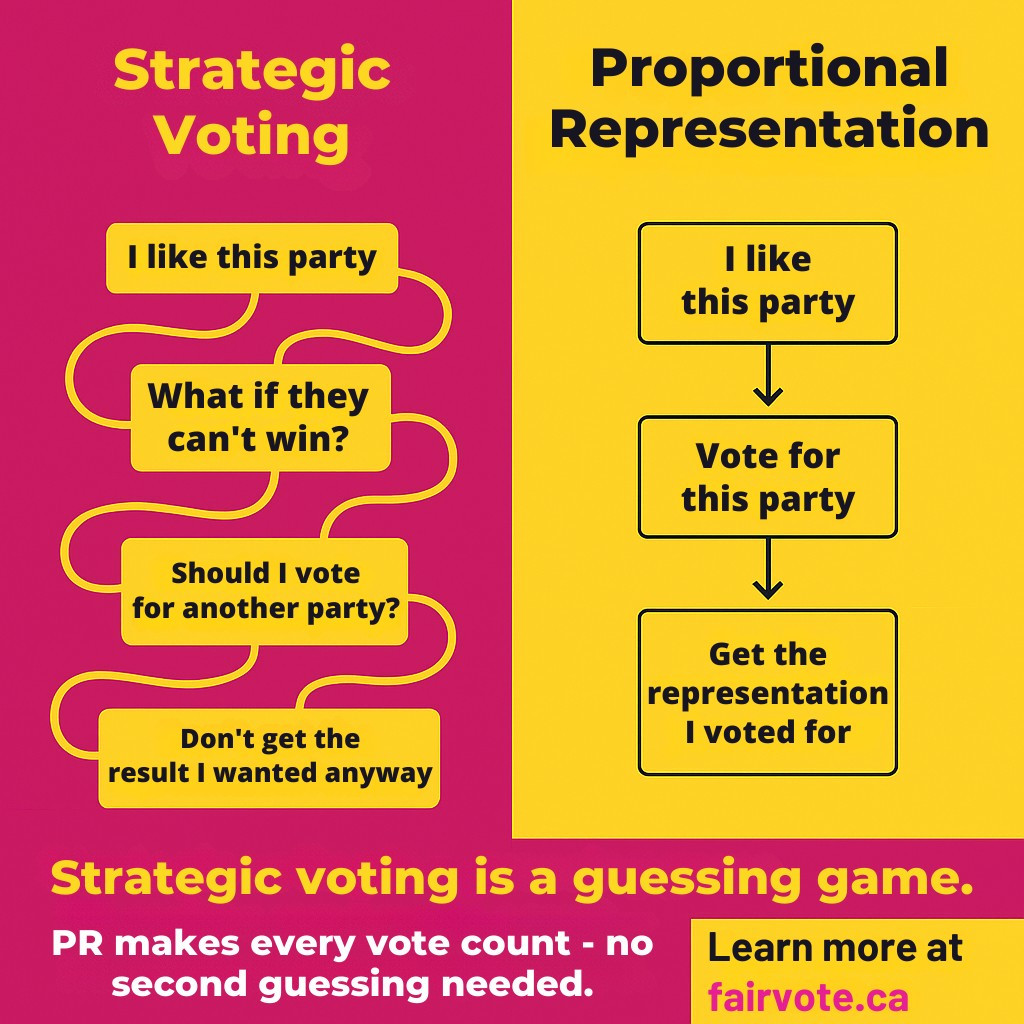Fairvote Canada
What is This Group is About?
De Quoi Parle ce Groupe?
The unofficial non-partisan Lemmy movement to bring proportional representation to all levels of government in Canada.
🗳️Voters deserve more choice and accountability from all politicians.
Le mouvement non officiel et non partisan de Lemmy visant à introduire la représentation proportionnelle à tous les niveaux de gouvernement au Canada.
🗳️Les électeurs méritent davantage de choix et de responsabilité de la part de tous les politiciens.

- A Simple Guide to Electoral Systems
- What is First-Past-The-Post (FPTP)?
- What is Proportional Representation (PR)?
- What is a Citizens’ Assembly?
- Why Referendums Aren't Necessary
- The 219 Corrupt MPs Who Voted Against Advancing Electoral Reform
Related Communities/Communautés Associées
Resources/Ressources
Official Organizations/Organisations Officielles
- List of Canadian friends of Democracy Bluesky
- Fair Vote Canada: Bluesky
- Fair Voting BC: Bluesky
- Charter Challenge for Fair Voting: Bluesky
- Electoral Renewal Canada: Bluesky
- Vote16: Bluesky
- Longest Ballot Committee: Bluesky
- ~~Make Votes Equal / Make Seats Match Votes~~
- Ranked Ballot Initiative of Toronto (IRV for municipal elections)
We're looking for more moderators, especially those who are of French and indigenous identities.
Politiques de modération de contenu
Nous recherchons davantage de modérateurs, notamment ceux qui sont d'identité française et autochtone.
view the rest of the comments

I appreciate your engagement on this topic, and I understand your concerns based on your experiences abroad. Let me address your points and clarify what PR advocates are actually proposing for Canada.
First, let's distinguish between different PR systems. What works in the Netherlands (list PR) isn't what's being proposed for Canada. The main PR options suitable for our context are:
Mixed Member Proportional (MMP) - You maintain your local MP exactly as you have now, plus regional MPs to ensure overall proportionality. Regarding "enormous amounts of seats" - this is largely subjective, and MMP can be implemented without increasing the total number of seats at all. The legislature size is a design choice, not an inherent requirement.
Single Transferable Vote (STV) - Multi-member districts where you rank candidates by preference. Ireland has used this successfully since 1922.
Regarding your specific concerns:
On "ungovernability": Research shows PR countries actually have more stable policy direction, not less. What looks like "instability" to outside observers is actually democratic negotiation. Policy lurch costs far more - when each new FPTP government undoes the previous government's work.
On constitutional courts: While important for legal oversight, a constitutional court isn't universally considered a requirement for "proper democracy." Many well-functioning democracies have different systems of judicial review. The core of democracy is citizens having meaningful representation - which is precisely what PR aims to strengthen.
On local representation: Your experience of feeling represented by an MP you "can walk up to" is actually quite rare. For the majority of Canadians whose preferred candidate loses in their riding, they have no representative who shares their political values. Under FPTP, roughly half of all voters cast ballots that elect nobody at all - they have zero representation aligned with their views.
On subjective fairness: While cultural and historical factors certainly influence democratic experiences, we don't need to rely on subjective impressions. We have objective mathematical criteria for evaluating electoral systems: proportionality indices, wasted vote percentages, and voter satisfaction metrics all demonstrate that PR systems outperform FPTP in translating votes to seats fairly.
The fundamental democratic principle remains: in a democracy, citizens deserve representation aligned with their values. When 50% of votes have zero effect on election outcomes, as happens under FPTP, we have a serious democratic deficit.
Fair Vote Canada advocates primarily for MMP or STV - both proven systems that would work well within our Westminster parliamentary tradition while ensuring every vote counts.